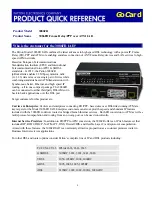
Convention Description
Boldface
Headings are in
Boldface
.
Courier New
Terminal Display is in
Courier New
.
II. Command conventions
Convention Description
Boldface
The keywords of a command line are in
Boldface
.
italic
Command arguments are in
italic
.
[ ]
Items (keywords or arguments) in square brackets [ ] are optional.
{ x | y | ... }
Alternative items are grouped in braces and separated by vertical bars.
One is selected.
[ x | y | ... ]
Optional alternative items are grouped in square brackets and separated
by vertical bars. One or none is selected.
{ x | y | ... } *
Alternative items are grouped in braces and separated by vertical bars. A
minimum of one or a maximum of all can be selected.
[ x | y | ... ] *
Optional alternative items are grouped in square brackets and separated
by vertical bars. Many or none can be selected.
III. GUI conventions
Convention Description
< >
Button names are inside angle brackets. For example, click the <OK>
button.
[ ]
Window names, menu items, data table and field names are inside
square brackets. For example, pop up the [New User] window.
/
Multi-level menus are separated by forward slashes. For example,
[File/Create/Folder].
IV. Keyboard operation
Format Description
<Key>
Press the key with the key name inside angle brackets. For example,
<Enter>, <Tab>, <Backspace>, or <A>.
<Key1+Key2>
Press the keys concurrently. For example, <Ctrl+Alt+A> means the three
keys should be pressed concurrently.
<Key1, Key2>
Press the keys in turn. For example, <Alt, A> means the two keys should
be pressed in turn.







































